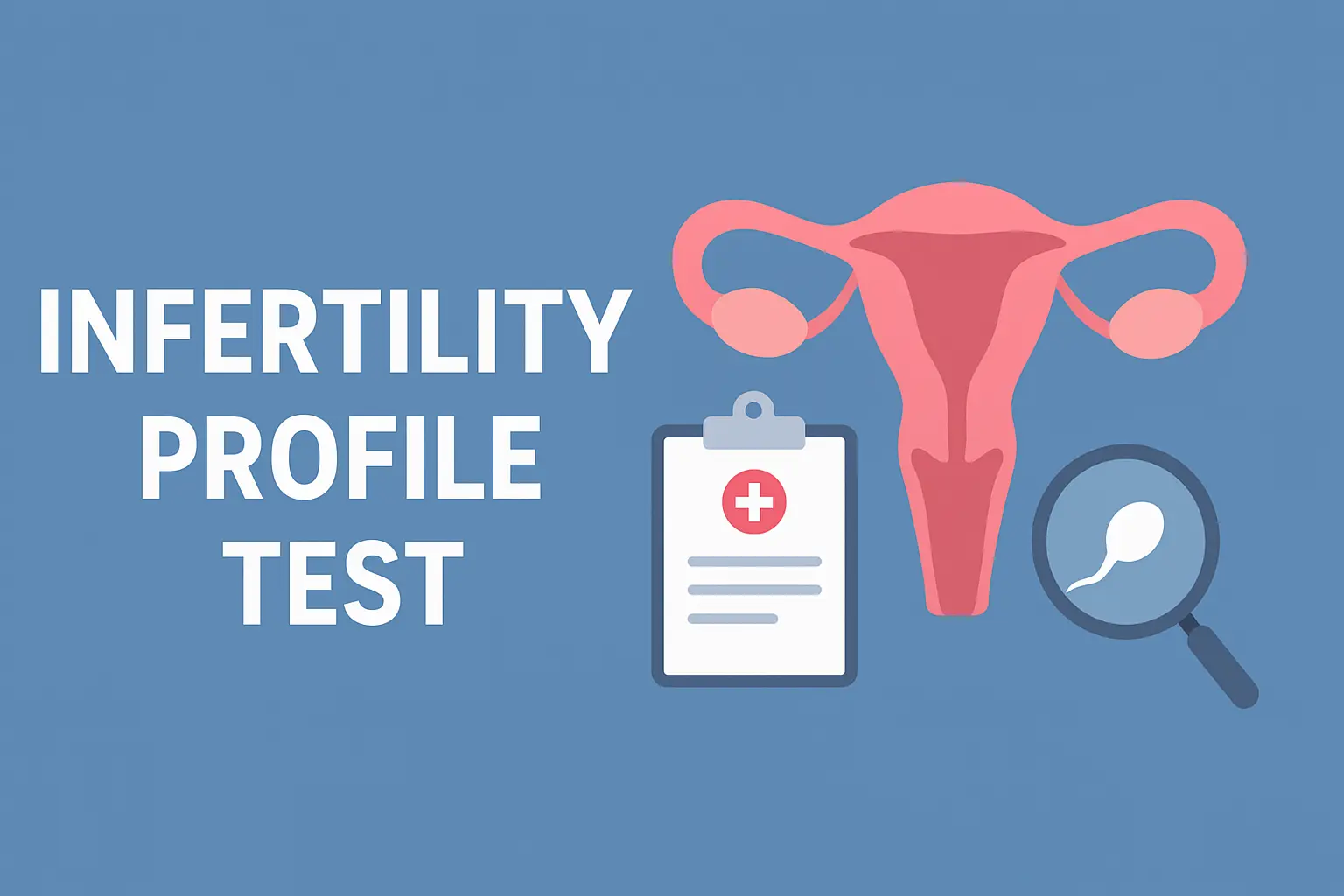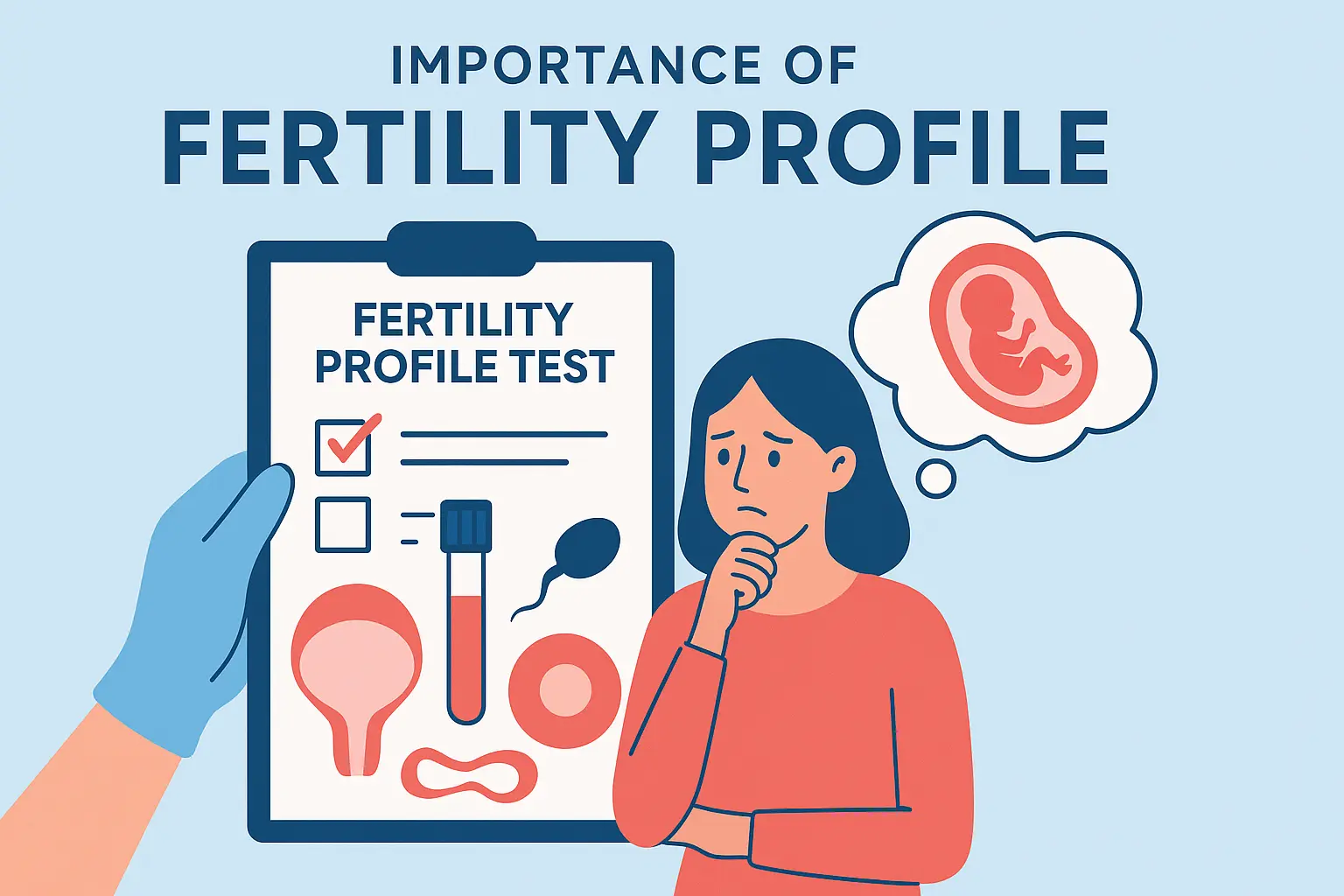Infertility Profile Test: What It Is, Why It’s Important, and How It Helps Conceive

An infertility profile test is a series of tests to assess reproductive health, with specific panels for men and women. It’s a comprehensive medical evaluation for both men and women facing issues in conceiving successfully.
This series of tests helps pinpoint hormonal, structural, and reproductive issues that can contribute to infertility. Taking these tests at an early stage can improve the chances of pregnancy. In this blog, we will explore infertility profile tests in detail.
What is an Infertility Profile Test?
A series of tests conducted to evaluate reproductive health and infertility, the infertility profile test is conducted in both men and women. For women, these tests include hormonal assessments, ovulation tracking, and an ultrasound to assess ovarian function, ovulation, and uterine health.
Procedures like hysterosalpingography may also be done to evaluate the patency of the fallopian tubes. Fertility tests for men include semen analysis to check the sperm count, motility, and morphology, as well as hormonal testing and imaging to evaluate the reproductive organs.
These tests, often carried out before starting the fertility treatments, provide a complete and comprehensive overview of reproductive health. It helps understand the underlying cause of infertility and make personalized plans and targeted treatments to achieve pregnancy.
Why Infertility Tests Are Important?

Infertility tests can help the doctor identify the root cause of infertility and plan for personalized treatment. These tests help pinpoint the exact reasons in most cases, rather than guessing them. It provides all the necessary information regarding reproductive health, hormone levels, and even the potential issues of both partners.
Even in the cases of unexplained infertility, taking comprehensive tests can identify the factors affecting the successful conception. Screening for infertility can also highlight other broader health concerns, like issues with the thyroid gland, PCOS, etc.
Infertility Profile Test for Women
Female infertility tests may include:
- Blood Tests: Certain hormonal imbalances, including progesterone, estradiol, thyroid-stimulating hormone (TSH), and prolactin, that can interfere with the production and maturation of eggs, are detected through blood tests.
- Ovarian Reserve Testing: Anti-Mullerian Hormone (AMH) test, or commonly known as ovarian reserve testing, combines fertility blood tests with a transvaginal ultrasound. This test measures antral follicle count (AFC) and the AMH hormone, which gives an idea of the egg count.
- Genetic Testing: Screenings at the genetic level are conducted to identify any genetic mutations that might be impacting fertility.
- Pelvic Ultrasound: A sonogram or pelvic ultrasound generates a detailed image of the female reproductive system. Conditions like uterine fibroids, ovarian cysts, or other abnormalities are also spotted with the help of a sonogram.
- Hysterosalpingogram: With the assistance of a tool named fluoroscopy, the pictures of the uterus and fallopian tubes are captured. This test helps in identifying any blockages in the fallopian tubes that might cause infertility.
- Hysteroscopy: A hysteroscope, a thin tube with a light, will be inserted into the uterus, which helps in examining the cervix and the inside of the uterus.
Infertility Profile Test for Men
The commonly conducted male infertility tests include:
- Semen Analysis: The semen collected from men is analyzed to gather information about the quantity of semen, the number, motility, and morphology of the sperm.
- Scrotal Ultrasound: High-frequency sound waves are passed through the scrotal sac to obtain an image of the testicles to see if there are issues with the supporting structure of the testicles, such as a varicocele.
- Transrectal Ultrasound: A small wand is inserted through the rectum to check for abnormalities of the prostate and any blockages of the semen carrying tubes.
- Hormone Testing: Abnormalities in the hormones can also induce infertility. Usually, blood tests are done to measure the levels of testosterone and other hormones.
- Post-Ejaculation Urinalysis: Sperm in the urine indicates that the sperm are traveling backward, to the bladder instead of forward, through the penis during ejaculation.
- Genetic Testing: Genetic causes of infertility, such as mutation, minor changes in the Y chromosome, or any other genetic abnormalities, are checked through genetic screening.
Cost of Infertility Profile Test
The cost of an infertility profile test can vary depending on the tests and evaluations included in the package, the provider, i.e., third-party labs, or an at-home kit, and the insurance coverage. It also depends on the city and the clinic providing the tests.
Generally, the infertility profile test can cost anywhere between $150 and $50,000. Advanced procedures like HSG, laparoscopy, or genetic testing may require additional charges. Check with your insurance provider to know whether infertility tests are covered in the scheme.
Preparing for the Test
Depending on your reproductive health and age, different medical evaluations may be recommended by your doctor. Here’s what you can do to prepare for your appointment:
- Talk to your doctor about your attempts to get pregnant, including the details about when you started trying to conceive, frequency of sex, ovulation time, etc.
- Discuss any health conditions you or your partner has, and information about previous treatments for infertility, if any.
- Mention the various medicines, vitamins, or other supplements you or your partner takes.
- You can list out the questions you have to ask the doctor.
- Talk with an open mindset and be ready to answer any questions regarding your sex life of reproductive health.
Understanding Test Results
Understanding the outcome of the fertility tests involves analyzing sperm and the major hormone levels, and imaging results. With different tests and evaluations done, it might be a bit overwhelming when you try to analyze the test results all by yourself.
It is recommended to review the results with the help of a fertility specialist so that you will get a clearer idea of what each value means. It is also important to note that certain abnormal values don’t always indicate infertility, and many of the conditions causing infertility are treatable, with high chances of getting pregnant.
It is these results that guide the doctors in choosing the medications, treatment measures, suggesting any lifestyle changes, or assisted reproductive techniques.
When to Get Tested?
If you are under 35 and haven’t gotten pregnant even after regular, unprotected intercourse for over a year, or if you are over 35 and haven’t conceived after six months, you are recommended to seek medical help. If your family has a history of infertility, or if you have certain conditions like irregular periods, pelvic inflammatory disease, or problems with ejaculation, and repeated miscarriages, you should visit the doctor immediately.
Conclusion
Infertility profile tests offer clarity about the causes of infertility and give a direction for proper and effective treatment. Early diagnosis and treatment improve conception chances and reduce anxiety related to infertility.
Frequently Asked Questions
FSH is a common blood test conducted to evaluate infertility. This test indicates the ovarian reserve and eggs remaining in the ovary.
Yes. About 10-15% of infertile men can have a complete lack of sperm.
Fertility profile tests for men include semen analysis and blood tests to check hormone levels like testosterone, FSH, and LH.
Yes. Although 40% of sperm motility can cause pregnancy, it is a bit uncommon.
Yes, infertility can be cured to an extent if treated timely, along with modifications in lifestyle, taking medications, etc.
